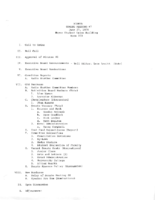Search the Special Collections and Archives Portal
Search Results

Meeting minutes for Consolidated Student Senate, University of Nevada, Las Vegas, June 27, 1978
Date
Archival Collection
Description
Text

Transcript of interview with Rosemary (Conner) Cleman by Beatrice Owens (Gillard), March 8, 1981
Date
Archival Collection
Description
Text

Transcript of interview with Henry Sheperd by Claytee D. White, October 22, 2014
Date
Archival Collection
Description
Text
Unger, Michael, 1947-
Mike Unger was born in Queens, New York in 1947, and spent most of his childhood in Long Island, growing up in a predominantly Jewish and Italian community. As a young adult, Unger was already working hard, running one of his family’s restaurant after school. When he was in high school, his family moved to Los Angeles to accommodate his father’s health needs, and eventually end up in Las Vegas by 1967. Over the next two decades, Unger would work at nine properties in the city.
Person
Galatz, Elaine B.
Elaine Galatz was born September 1, 1939 in Milwaukee, Wisconsin and studied English at the University of Wisconsin. In 1961, she married Neil Galatz and moved to Arizona. After attending the University of Arizona and Arizona State University for graduate studies and her teaching certificate, Galatz moved to Las Vegas, Nevada and taught at J.E. Manch Elementary. When her husband opened his own law firm in the mid-1960s, she served as the office manager and bookkeeper.
Person
Amie-Pilot, Ruby, 1932-
Ruby Amie-Pilot was born April 03, 1932 and raised in Karnack, Texas. In 1952, Amie-Pilot boarded a train with her two young sons, Curtis Rufus Jr. and Herbert, to join her high school sweetheart and husband, Curtis Amie, in Las Vegas, Nevada. His family had moved to Las Vegas in the 1940s, seeking better job opportunities. Upon arriving, however, Amie-Pilot found the living conditions quite appalling.
Person
Weiss, Walter
Walter Weiss (1935- ) is a former boxer and casino professional in Las Vegas, Nevada. Born in Providence, Rhode Island, Weiss started his boxing career at 16 years old and moved to New York City in 1953 to train professionally. His aptitude for boxing led him to be a sparring partner in New York City’s famous Stillman’s Gym, where he worked with some of the greatest fighters of the era including Rocky Marciano and Jack Dempsey. In 1958, Weiss moved to Las Vegas to find work with a local bookmaker, Elliott Price.
Person
Clark, Donald M., Reverend, 1933-2017
In 1952, after serving in the Army, Reverend Donald M. Clark moved to Las Vegas, Nevada where he became an assistant pastor and began working towards integration and improving the lives of the black community. His firm stance on equal rights led him to the National Association for the Advancement of Colored People (NAACP), where he worked with James McMillan and Charles West to lobby Nevada Governor Grant Sawyer and other public figures to initiate integration in Las Vegas.
Person
